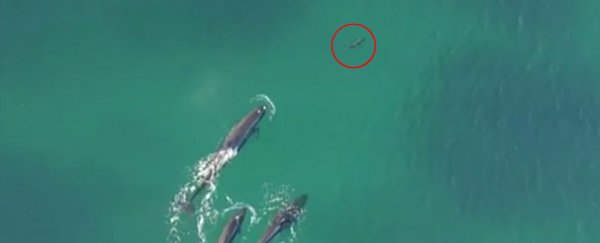It's a tough world out there. One day you're the top of the food chain, striking fear in the hearts of all those who behold you. The next, you're being chased down by a group of false killer whales that want to snack on your body like an anchovy.
That's precisely what happened to a lone shark in the crystal clear waters off the coast of Cronulla, south of Sydney, which was caught in this spectacular aerial footage by drone hobbyist, Bruno Kataoka. It's pretty awesome viewing, and also one of the rare times we've spotted mysterious false killer whales (Pseudorca crassidens) in the wild, providing researchers with valuable insight into their bad-ass behaviour.
False killer whales grow to between 3 to 5 metres and are the third-largest member of the oceanic dolphin family and they look quite a lot like orcas, except they're black with a grey thoat and chest rather than black and white.
And just like orcas, the false killer whales also attack and kill other cetaceans, but this footage suggests they might also like to chow down on sharks from time to time.
Rare scenes captured off Cronulla show sharks being hunted by whales. @AdeneCassidy7 #7News https://t.co/wv7z7BWglR
— 7NEWS Sydney (@7NewsSydney) May 10, 2016
At the end of the video, after tiring out its prey, one of the four false killer whales snatches the shark in its mouth like a toy, and then drags it down into the depths.
"We did not expect to see what we saw, it was a really exciting moment," Kataoka told 7 News Sydney. He was flying his drone just off Cronulla beach when he caught the chase on film. "National Geographic guys have been waiting months to get such a thing and we just happened to be there at the right moment at the right time."
The species of shark that meets its untimely end can't be identified from this footage, and it's impossible to officially confirm that the whales we're seeing are false killer whales without getting a closer look, or a sample of their DNA. But marine biologist Georgina Wood tells 7 News that their size and colouring makes it very likely they're the predators in this video.
That's exciting, because we still know very little about the lifestyles of false killer whales - most of our information on them comes from examining stranded specimens.
"It's amazing, that kind of footage is just so rare to catch," Wood adds, explaining that at this time of year, it's the larger humpback whales that are more likely to be spotted off the coast of Sydney.
With more and more amateur drone users out there, let's hope that we catch more of these incredible moments of animals doing their thing in the future. Nat Geo, eat your heart out.
